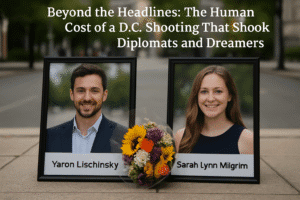Beyond the Headlines: The Human Cost of a D.C. Shooting That Shook Diplomats and Dreamers
Federal prosecutors have charged Elias Rodriguez, 31, with hate crimes and first-degree murder for the May shooting deaths of Israeli embassy staffers Yaron Lischinsky, 30, and Sarah Lynn Milgrim, 26, outside a Washington D.C. Jewish museum. The indictment details Rodriguez’s alleged premeditation, including traveling from Chicago with a gun and researching the victims’ networking event. Prosecutors state he fired 20 shots at the couple, then declared “I did it for Palestine” during his arrest.
The charges cite Rodriguez’s documented online hostility toward Israel and a manifesto supporting Palestine. Tragically, Lischinsky reportedly carried an engagement ring intending to propose to Milgrim days later. The Justice Department included findings allowing pursuit of the death penalty, emphasizing the attack’s planning and bias-driven nature. This case underscores how geopolitical hatred can abruptly end individual futures and devastate communities.

Beyond the Headlines: The Human Cost of a D.C. Shooting That Shook Diplomats and Dreamers
The cold legal language of a federal indictment – nine counts, including hate crimes and first-degree murder – now frames the May shooting deaths of two Israeli embassy staffers in Washington D.C. But behind the charges against Elias Rodriguez lies a story shattered not just of geopolitics, but of deeply personal futures extinguished.
Yaron Lischinsky, 30, and Sarah Lynn Milgrim, 26, weren’t just diplomats; they were young professionals building lives. The haunting detail revealed by Israeli Ambassador Yechiel Leiter adds a layer of profound loss: Lischinsky carried an engagement ring, planning to propose to Milgrim in Jerusalem the following week. Their attendance at a routine networking event for young Jewish professionals at the Capital Jewish Museum should have been a mundane step in their journey, not its end.
The Path to Violence: From Online Rhetoric to Real-World Tragedy
Prosecutors allege Rodriguez’s journey began far from D.C., rooted in online vitriol. His reported social media posts (“Death to Israel”) and a self-authored “explication” document, expressing support for Palestine and accusing Israel of extermination, paint a picture of radicalization. The deliberate nature is stark: traveling from Chicago with a handgun, researching the museum event, purchasing a ticket, and allegedly lying in wait.
The moment violence erupted was chaotic and brutal – 20 shots fired outside the museum. The words Rodriguez allegedly uttered, first at the scene (“I did it for Palestine. I did it for Gaza”) and later during arrest (“Free Palestine”), instantly transformed a horrific murder into a potential act of ideologically driven hate. The DOJ’s inclusion of findings paving the way for a potential death penalty underscores the gravity with which they view the alleged motivations: “substantial planning” and targeting victims based on their perceived nationality and association with Israel.
The Unanswered Questions & Lingering Shadows
This case forces uncomfortable reflections:
- The Escalation of Rhetoric: How does online hatred manifest in real-world violence? Rodriguez’s alleged path from digital posts to targeted attack is a chilling case study.
- Targeting the “Accessible”: Diplomatic staff, especially junior ones attending public events, represent a vulnerable point where political animus can find a tragically accessible target.
- The Ripple Effect: Beyond the devastating loss for families and the embassy community, such acts poison the well of civil discourse and heighten fear among minority groups.
- Justice & Motive: While the legal process will determine guilt, the hate crime charges explicitly confront the why. Understanding this motive is crucial, not for justification, but for prevention.
Remembering the Lives, Not Just the Deaths
As the case against Rodriguez moves forward, dominated by legal arguments and geopolitical implications, it’s vital to hold space for Yaron and Sarah – not as symbols, but as individuals. They were colleagues, friends, a couple in love on the cusp of engagement, young people contributing to international relations. Their murders are a stark reminder that the abstract conflicts of the world can, with devastating suddenness, shatter intensely personal dreams on a city sidewalk. The pursuit of justice, while necessary, cannot mend that rupture; it only underscores the profound, human cost of hate-fueled violence.
You must be logged in to post a comment.